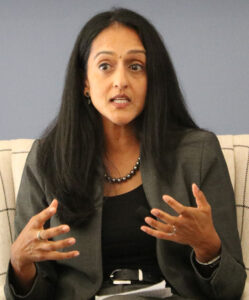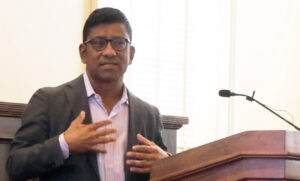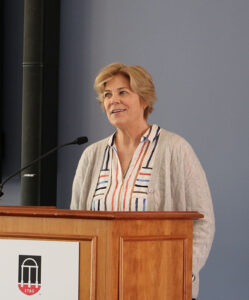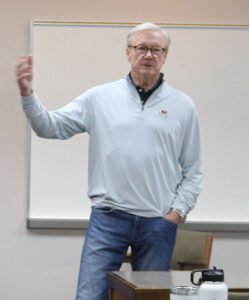U.S. associate attorney general delivers Johnson Lecture
 The 2024 Judge Horace J. Johnson, Jr. Lecture on Race, Law and Policy was presented by Vanita Gupta, who was the 19th U.S. associate attorney general at the time of the event.
The 2024 Judge Horace J. Johnson, Jr. Lecture on Race, Law and Policy was presented by Vanita Gupta, who was the 19th U.S. associate attorney general at the time of the event.
During a conversation moderated by Assistant Professor John B. Meixner and Clinical Associate Professor & First Amendment Clinic Director Clare R. Norins, Gupta shared her thoughts on her career as a civil rights lawyer as well as the challenges and opportunities she experienced moving into her position with the U.S. government.
As the third-ranking official at the Department of Justice, Gupta supervised multiple litigating units within the DOJ, including the Civil, Civil Rights, Antitrust, Tax, and Environmental and Natural Resources divisions. From 2014 to 2017, Gupta held the position of acting assistant attorney general and head of the DOJ’s Civil Rights Division.
She is currently the president and chief executive officer of the Leadership Conference on Civil and Human Rights, the nation’s oldest and largest coalition of non-partisan civil rights organizations in the United States.
With support from UGA’s Presidential Task Force on Race, Ethnicity and Community, the School of Law and the School of Public and International Affairs established the Judge Horace J. Johnson, Jr. Lecture on Race, Law and Policy in memory of the late jurist, who was a trailblazer for the Black community in Georgia and a 1982 School of Law alumnus.
Chicago Law School professor presents Sibley Lecture
 The University of Chicago Law School’s Aziz Z. Huq delivered the 122nd Sibley Lecture, which focused on the topic “The Necessary and Proper Stewardship of Judicial Data.”
The University of Chicago Law School’s Aziz Z. Huq delivered the 122nd Sibley Lecture, which focused on the topic “The Necessary and Proper Stewardship of Judicial Data.”
During the lecture, Huq highlighted the growing importance of data to improving the judicial system, including how the information is created and regulated.
“We stand in the wake of the revolutionary developments in large language models – tools like ChatGPT – that can extract immensely insightful inferences from very large pools of data,” he said. “Using large language models, with respect to judicial data, it is possible to map out a range of issues about how the federal courts work in ways that advance legality and increase the quality of access to justice.”
Huq argued that judicial data should be seen not as a source of “economic rent” but as a public asset. He suggested there is “ample room for public action, specifically through Congress,” to regulate judicial data and make it more often collected by courts and accessible for public research.
Huq, the holder of the Greenberg Professorship, is a scholar of U.S. and comparative constitutional law. Before entering academia, he served as counsel and then director of the Brennan Center’s Liberty and National Security Project, where he litigated cases in the U.S. Courts of Appeals as well as the Supreme Court. He also researched and wrote on constitutional design and implementation as a senior consultant analyst for the International Crisis Group. After graduating from Columbia Law School, Huq served as a judicial clerk for Judge Robert D. Sack of the U.S. Court of Appeals for the Second Circuit and for U.S. Supreme Court Justice Ruth Bader Ginsburg.
The Sibley Lecture Series, established in 1964 by the Charles Loridans Foundation of Atlanta in tribute to the late John A. Sibley, is designed to attract outstanding legal scholars of national prominence to the School of Law. Sibley was a 1911 graduate of the law school.
—Mason A. Brock
Title IX expert gives Edith House Lecture
 Janet Judge, co-founder of the Education & Sports Law Group, presented the 41st Edith House Lecture titled “The Art of Providing Legal Counsel When the Subject Matters to You Personally.”
Janet Judge, co-founder of the Education & Sports Law Group, presented the 41st Edith House Lecture titled “The Art of Providing Legal Counsel When the Subject Matters to You Personally.”
Judge has more than 30 years of experience working with higher education clients. She regularly represents and advises NCAA Division I, II and III schools and presents at conferences on Title IX athletic equity compliance, sexual misconduct prevention and response, and athlete well-being.
During her lecture, Judge focused on the legal landscape of college sports. A former Division I athlete and collegiate-level coach, she shared that while serving as a judicial clerk for Judge Norman Stahl of the U.S. Court of Appeals for the First Circuit that the court heard Brown v. Cohen, which she described as “the seminal Title IX case around athletic equity.”
Thus began her legal career focused on higher education and athletics. In the years after her clerkship, Judge’s interest in the legal side of sports continued to grow and she began publishing law review articles and speaking at different events about the topic.
“And as a result of all that I built this law practice where there was no real sports law, especially a sports law practice for a female practitioner, who’s focused on Title IX, on hazing, on civil rights issues, as well as traditional NCAA compliance and those sorts of things that are out there,” she said. Judge added that she was in part motivated to do so because sports had such an impact on her own life.
The Edith House Lecture is sponsored by the UGA Chapter of the Georgia Association for Women Lawyers in honor of one of the first female graduates of the School of Law. House, a native of Winder, Georgia, was co-valedictorian of the law class of 1925, the first to graduate women.
Legal leaders share professional experiences with students
Several experienced legal professionals visited campus throughout the 2023–24 year to engage with students in a variety of settings.
Former U.S. Sen. Saxby Chambliss spoke to law students at an event hosted by the Federalist Society. Chambliss, who is currently a partner with DLA Piper and also serves as the School of Law’s Sanders Scholar in Political Leadership, discussed his career in law and how it impacted his subsequent service in the public sector.

John Parker, former Coca-Cola senior vice president and general counsel
John Parker, who retired after 30 years as an attorney with the Coca-Cola Company, visited Clinical Assistant Professor Scott Lowry’s (J.D.’07) Corporate Counsel Externship class during the spring semester to share his thoughts regarding the keys to a successful legal career, including the critical role trust plays in allowing an attorney to serve the client not only as a lawyer but, ultimately, as a counselor and business partner.
Sibley Professor in Corporate and Business Law Larry D. Thompson taught a UGA Law class titled Corporate Social Responsibility. A former U.S. deputy attorney general, Thompson invited several guests to his class, including Leo S. Mackay, Jr., senior vice president of Ethics and Enterprise Assurance at Lockheed Martin, who discussed a number of topics, including establishing a culture of integrity in an organization, contemporary issues in corporate governance and career advice for law students.
